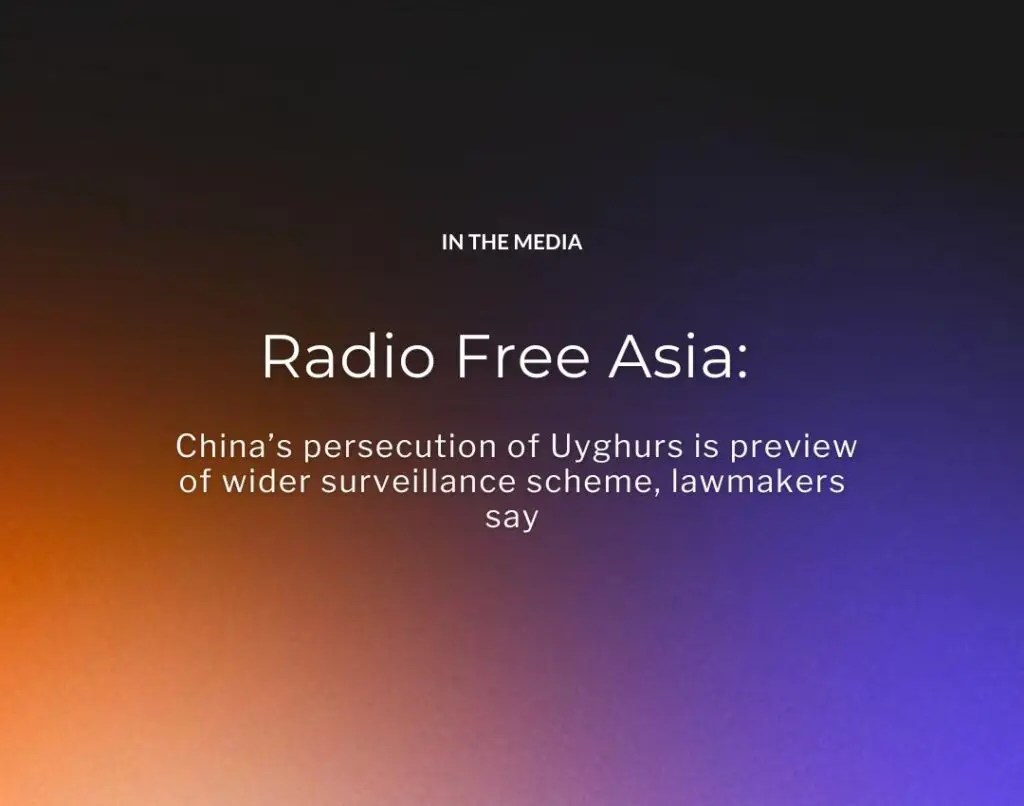Author tells panel what’s happened in Xinjiang amounts to ‘mass psychological torture.’
By Roseanne Gerin and Alim Seytoff
Radio Free Asia
Published November 17, 2021
Members of a bipartisan congressional commission warned Wednesday that China’s use of technology to repress Muslim Uyghurs in its far-western Xinjiang is widening and could be exported around the world.
The U.S. Congressional-Executive Commission on China, which Congress established in 2000, held a hearing in Washington to draw attention to human rights abuses and the strategic impact of mass surveillance technology and censorship used by China, including in the Xinjiang Uyghur Autonomous Region.
Sen. Jeff Merkley, co-chairperson of the 17-member commission, said that without proper guardrails to protect privacy and human rights, technology can be used by authoritarian regimes to control populations, prevent freedom of expression, and undermine democratic institutions.
China has “the most pervasive surveillance state the world has ever seen” using technologies such as artificial intelligence, blockchain, and cloud computing, said Merkley, a U.S. senator from Oregon.
The government has amassed huge amounts of data from cell phones, personal computers, and security cameras to impose political and social control of targeted populations, he said.
“Nowhere do we see this more than in the Xinjiang Uyghur Autonomous Region,” Merkley said.
For years, Chinese authorities have subjected Uyghurs and other Turkic minorities in Xinjiang to arbitrary arrests and restrictions on their religious practice and culture. The system is enforced by a pervasive digitized system that monitors the every move of residents through surveillance drones, facial recognition cameras, mobile phone scans, and an extensive police presence.
China’s Digital Silk Road — a component of its Belt and Road Initiative to enhance digital connectivity abroad — is “an intrusive ecosystem of internet architecture and surveillance technology aiming to expand the People’s Republic of China’s influence around the world,” Rep. Chris Smith said.
“Chinese authorities’ relentless persecution of predominantly Muslims Uyghurs, Kazakhs, and other Central Asian people in the country’s Xinjiang region provides a disturbing preview of what these tools’ misuse [would be] on an even broader scale,” he said.
China has held up to 1.8 million Uyghurs and others in “re-education” camps since 2017. It dismisses widely documented evidence, including testimony from former detainees and guards, that it has mistreated Muslims living inside and outside the camps.
Instead, Chinese officials contend that the camps are vocational training facilities used to prevent religious extremism and terrorism in the region, which is home to about 12 million Uyghurs.
But Geoffrey Cain, author of a recent book on surveillance in China, told commission members that former camp detainees and Uyghur and Kazakh refugees he had interviewed told similar stories about Xinjiang’s “descent into a total surveillance dystopia.”
China uses its Integrated Joint Operations Platform to store data collected from police human inputs, camera surveillance and criminal and court histories. It then takes the information to determine whether Uyghurs are likely to commit a crime, Cain said. Local police interrogate and detain Uyghurs flagged by the system through notifications sent to the authorities’ smartphones.
The technologies developed by Chinese tech firms such as telecom giant Huawei, facial recognition technology provider Megvii, and AI software provider SenseTime amount to a “system of mass psychological torture,” he said.
Xinjiang minority residents have a “feeling of constantly being watched not by humans, but by crude software algorithms designed to predict future crimes and acts of terrorism with great inaccuracy,” Cain said.
“The reasons for detention could be as far-flung as whether they went through the front or back door, whether they began a physical exercise routine suddenly, and whether they had the flu and were simply late for work that day,” Cain told the commission.
There was no immediate response about the hearing from the Chinese government.

‘Situation could have been far worse’
The hearing came two days after a three-hour virtual meeting between U.S. President Joe Biden and his Chinese counterpart Xi Jinping to discuss bilateral relations.
During the meeting, Biden underscored U.S. concerns about human rights in Xinjiang, Tibet, and Hong Kong, according to a briefing the following day by National Security Advisor Jake Sullivan. He did not elaborate on what was said.
Dolkun Isa, president of the Germany-based World Uyghur Congress, said he was grateful that Biden broached China’s atrocities against the Uyghurs during the virtual summit with Xi.
“If it was not for America’s condemnation of China committing genocide against Uyghurs, our situation could have been far worse today,” he told RFA on Tuesday.
“The Biden administration must boycott the Beijing Winter Olympics,” Isa said. “If it doesn’t, it’ll only embolden China to continue to commit the genocide.”
In June, the U.S. Congressional-Executive Commission on China urged Thomas Bach, president of the International Olympic Committee, to postpone the 2022 Beijing Games and to relocate them if the host government did not end its human rights abuses.
The U.S. government has declared that the China’s campaign of abuse against Uyghurs in Xinjiang amounts to crimes against humanity and genocide.
On the same day Biden and Xi met, the 2021 China Xinjiang Development Forum was held in Beijing to highlight the success of the Belt and Road Initiative and the important role Xinjiang has played, while accusing Washington of using the issue to weaken China.
“The U.S.-led Western anti-China forces time and again manufactured Xinjiang related empty claims such as ‘genocide,’ ‘forced labor,’ and ‘forced sterilization’ and used so-called human rights issues to harshly interfere in China’s internal affairs,” said Jiang Jianguo, vice minister of the Chinese Communist Party’s Central Propaganda Department.
“Through political motives, they attempted to ‘use Xinjiang to contain China’ and ‘use terrorism to constrain China.’ By wreaking havoc in Xinjiang, they attempted to prevent the development of a strong China,” he said.

See Also:






